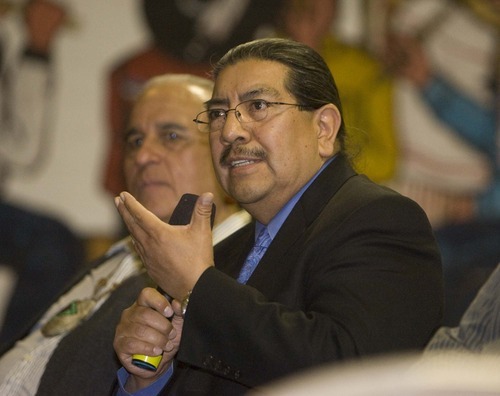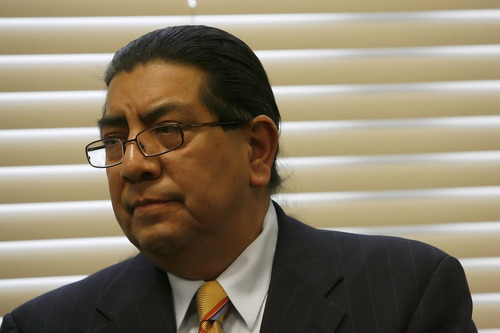This is an archived article that was published on sltrib.com in 2011, and information in the article may be outdated. It is provided only for personal research purposes and may not be reprinted.
Members of Utah tribes are angry that Gov. Gary Herbert fired Forrest Cuch, who for more than 13 years straddled the often-shaky bridge between sovereign governments — the state of Utah and the eight tribes with members in the state.
Cuch said Friday evening that he was given no reprimand, no warning and no reason for his dismissal.
"The only thing the letter said was … they were changing the direction in my office," he said. "I was totally blindsided."
Tribal representatives were angered both by how the governor treated Cuch, who as the governor's liaison to the tribes is widely respected among tribal leaders, and by the fact that they were not consulted.
"Our tribal leaders are basically on the same level of the governor. It would be common courtesy to at least notify them," said Ed Naranjo, tribal administrator for the Confederated Tribes of the Goshutes in western Utah. "It really affects the tribes. Forrest was a very, very, very good asset to us."
Ally Isom, deputy chief of staff for the governor, declined to discuss the details of the firing because it's a personnel issue but said the governor "wants to take the Division of Indian Affairs in a different direction."
Isom said the governor has high regard for the division and is putting Lt. Gov. Greg Bell in charge there until he can find a replacement. The tribes will be consulted on that search, Isom said.
In an e-mail to friends and family, Cuch pointed to three issues that may have been a factor in his firing.
"There has been some controversy over an archaeological site in Draper and Utah Transit Authority (UTA), water-rights struggles between the state versus Goshutes and Utes, and jurisdiction and law enforcement disputes in the Uintah Basin," Cuch wrote in his e-mail. "I thought I handled them properly and professionally but apparently not to the liking of the governor."
In the most recent of these disputes in the Uinta Basin, a number of small businesses were angry that the Ute Tribe had raised business taxes, and Herbert asked Cuch to respond to the complaints, he said Friday.
Cuch said those businesses were irate to learn that the tribe was within its rights to raise taxes, but he could not say whether that contributed to the governor's decision. "My observation is whoever screams the loudest gets their way up there."
Patty Timbimboo Madsen, cultural resources officer for the Northwestern Band of the Shoshone Tribe in Brigham City, said Cuch, a member of the Ute Indian Tribe, always had a tough job.
He was a government employee and had to be loyal to the state, and yet his heart was with the tribes, said Madsen, who serves on the division's Human Remains Committee, which Cuch coordinated.
Irene Cuch, a member of the Ute business committee and Cuch's aunt by marriage, said she was shocked and unhappy with the governor's decision.
"There was no consultation whatsoever," said Irene Cuch. "Forrest has been a very reliable resource for the tribes."
Cuch said he intends to work more with Rising American Indian Nations, a nonprofit he co-founded and has advised.
His firing was like the relationship he had with Herbert and Bell, he said.
"It was only one-sided," said Cuch. "I would share, but I would never get anything back. There was no teamwork. It was always just, 'You serve me and that's it.' "
Cuch was given the news and his dismissal letter Thursday afternoon by Michael Hansen, interim director of the Utah Department of Community and Culture.
Cuch was required to pack up and leave his office immediately, with no further access to his computer, he said. By Friday morning, his state-issued telephone was disconnected.
"It was dehumanizing after 13 years," said Cuch. "I have no clue what this is and … they treat you like a criminal."





